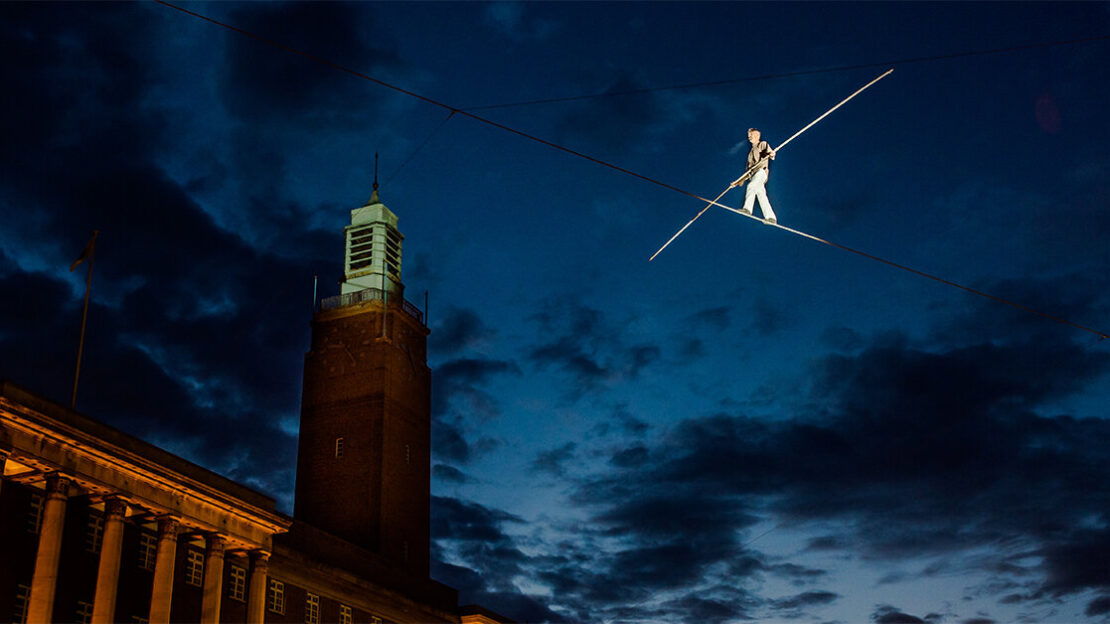In this month’s guest blog Mark Denbigh, Head of Production & Programme at Norfolk & Norwich Festival (NFF), shares his journey to establishing sustainability at the heart of an event and organisation.
NNF is a member of the Artistic Directorate of Without Walls and Mark is a Without Walls board member and environmental champion. NNF is also a member of In Situ, the European network for Art In Public, and Mark is a member of In Situ steering committee. NNF is currently participating in the Arts Council England and Julie’s Bicycle Accelerator Programme. Mark has most recently joined the Vision: 2025 UK Outdoor Events Environmental Steering Group.
“My journey to establishing sustainability of the heart of an event and organisation.
Norfolk & Norwich Festival is an annual multi arts festival that takes place over 17 days each May, for an audience of around 85,000 people. The festival connects with a wide range of people in a multitude of ways. We work with an amazing range of local, national and international artists each year to present 60 to 70 individual projects. We often use other people’s venues and spaces in order to do that, as well as creating our own venues and running our own sites for audiences. It takes us the full year to programme, gather permissions and develop the entire programme ready to deliver every May.
I started working at the Festival in 2007. It seems a long time ago now in so many ways. The scale and breadth of the festival has continued to grow, and many of the issues artists and society are focusing on have changed beyond recognition. As an organisation we’ve become much better at communicating, and the connectivity that we can have with our audience has become much more sophisticated. The festival has always had community at its core: from its beginnings in 1772 as a fundraiser for the Norfolk & Norwich Hospital (we celebrate the festival’s 250th anniversary in 2022) through to the fantastic engagement and education work that runs all year round today.
Around six or seven years ago, I put my hand up to represent the Production Department at the newly formed Green Team meetings that were established as a way for the organisation to talk about sustainability in our work. The idea was to have representation from each department in the organisation so that we could collectively agree on an Environmental Policy and Action Plan. We worked in an office all year round, and then we were all out and about during the festival period. It made sense. We could identify areas to make sustainable choices, and we could action them. There was keenness in the organisation to make positive changes, but it often felt like a fairly practical and process driven initiative.
A few years later, I was asked to lead the group. I was passionate about sustainability, but also in a position to be able to talk to other similar organisations about their approach and what they were doing with their events. Whenever I would visit another festival, I would try to arrange a meeting with the member of staff who was responsible for sustainability at their event and I was driven and inspired by what other people were doing both in the UK and across Europe.
I realised that whilst the Action Plan is cross organisation, it was also quite detailed and lengthy, so felt that it could be clearer for us to have a headline action for each coming festival. ‘End the use of single use plastics on site’ was our aim back in 2018 – pretty big and clear, and applicable across each department in the organisation. I started to budget a line for sustainability in the Production Budget each year, so that we wouldn’t stumble in our aims. We work each year in a city centre park and we managed to get a drinking water point established there for the first time. This was available for audiences as well as our crews and artists – a short lived battle began with some of our outside caterers, some of whom tried to sell canned water instead – not fully grasping the goal to reduce our recycling of unnecessary items as much as reduce our single use plastic through the sale of water bottles. Other events organisers started to ask us how we had managed to achieve certain goals and became interested in our actions. After years of conversation with the local council, hard power will be installed in the park this winter; eliminating the need for generators to be hauled on to site and burning fuel for the duration of our event, as well as all of the other events that take place in the same park each year. This will be a huge reduction in our city’s impact, and a massively positive step forwards thanks to the collaborative nature of our work with the council.
I believe in a holistic approach to sustainability at events. It works well to have sustainability running through all aspects of an organisation. We encourage artists to travel by train to Norwich for their work, and will support them to be able to do this. We also do that ourselves when visiting other events. Sustainability is at the start, middle and end of our thinking process. So many times I’ve seen it being bolted on as an afterthought, and this approach rarely works effectively. By including it at the start of a process, it remains significant for everyone at every step of the way – and means that organisers, artists and audiences all recognise and feel the benefits.
We’re currently working on how we communicate our approach to sustainability. It feels less useful to simply talk about the achievements we’ve made and the impact we’ve had. Rather, in addition to this, we need to find an effective way to open a conversation with our audience and partners as to what the challenges are, and how we can all encourage each other to innovate and inspire. To share, and be open and honest. We’ve made as many mistakes along the way as anything else and we’re not ashamed to talk about those. Sustainability is an area of event planning that isn’t ever ticked off on the list as complete, so we must encourage sharing and collaboration across the sector and find better ways to connect our passion and learning in this area.
We’re increasingly working with artists who share our passion for sustainability and are actively working at every stage of their process to adapt their approach to making and touring in to a more sustainable one. We are encouraging them to expect more from presenters too so we’re all jointly accountable.
We’ve taken the learning we’ve had across our networks and partnerships. NNF is a member of Without Walls, a network of 36 festivals and presenters who develop, support commission and present a wide range of diverse and innovative outdoor artists and projects each year and we share our knowledge and learning amongst this group, as well as across the IN SITU network who are a Creative Europe funded network for Art In Public Space. “
This Guest Blog originally appeared in our November 2020 Vision: 2025 newsletter. Sign up receive monthly event sustainability news, case studies and guest blogs direct to your inbox using the form below.


